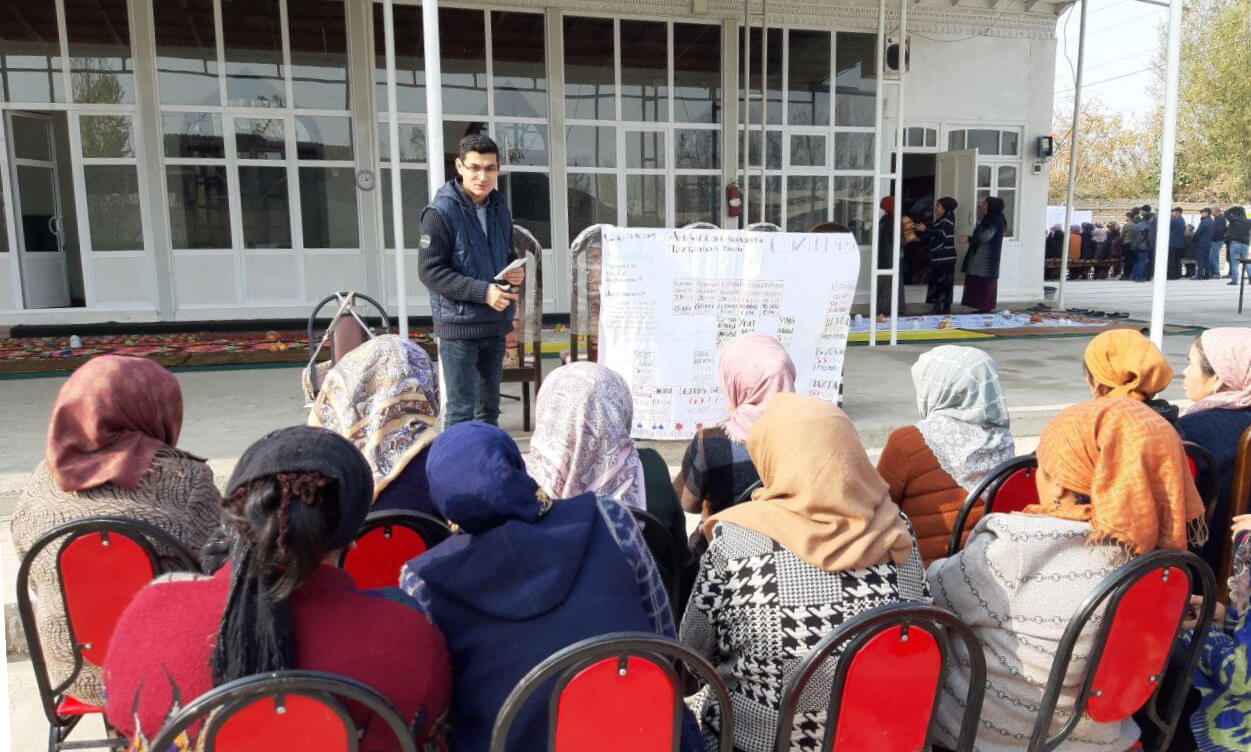Introducing community-led planning to Uzbekistan’s Covid response

The Covid-19 pandemic has put unprecedented pressure on governments across the world to support and protect vulnerable citizens. Like many countries, Uzbekistan has faced the challenge of ensuring that its package of support is equally accessible to all citizens, including those living in remote rural regions far from the capital, Tashkent. Through his work at Uzbekistan’s national think tank for reforms, Yuksalish, Shamshod Yunusov (Uzbekistan, 2018) has launched a new project that will introduce the best of participatory planning, budgeting and delivery to the country’s Covid response and, in the long term, aims to change the way that all social support is delivered in remote communities.
The project is Shamshod’s brainchild. It was borne of a combination of his research and analysis into the challenges of delivering social support during the Covid pandemic, and his extensive experience of leading grassroots civic participation initiatives in remote villages in the Ferghana Valley. Shamshod and his team have designed a participatory model to tackle the challenges of providing fair, transparent and needs-based support to the most vulnerable villagers in remote communities. The model centres on putting vulnerable communities at the heart of the design, budgeting and decision-making processes linked to the support they are to receive and demonstrating that such approaches lead to better results both for communities and the local authorities. Yuksalish is working closely with the newly established Ministry of Mahalla and Family Support, which is responsible for local delivery of social support and so it is expected that the participatory practices that have been tried and tested during the Covid response will be adopted for long-term use by local governments across Uzbekistan.
It is hard to think of a better person to lead a project to empower remote villagers to organise themselves and make their needs heard. Before joining Yuksalish, Shamshod had spent many years liaising between community members, local authorities and international donor projects.
When Shamshod was awarded a place on the John Smith Trust Fellowship Programme in 2018, he had recently co-founded the ‘Ferghana Taraqqiyot Centre’, a not-for-profit organisation supporting community development in the Ferghana Valley. Shamshod was an experienced community mobiliser, grassroots activist and communications specialist who had gained very practical skills for empowering citizens to become active participants in the design and delivery of local services through several years of working on rural water supply and sanitation projects with the Swiss Development Cooperation. At that time, Shamshod’s NGO was supporting mahalla [neighbourhood] committees and water users associations in over 36 villages in the Ferghana and Syrdarya regions to work together to build and maintain their water supply infrastructure.
‘It was very important to have the villagers’ involvement in participating and feeling the ownership of what is being constructed’ Shamshod says, ‘since in the end, the water systems would be owned and managed by them. The elements of decentralisation and self-governance were introduced to the communities of Uzbekistan with this approach’.
During the Fellowship Programme, Shamshod was interested in learning about approaches used in the UK to mobilise citizens to play a more active role in local governance and creating more responsive local authorities. He had a vision that by combining the practical local knowledge that he had gained through local water governance with international best practice on citizen engagement, he would be able to help mahalla committees and local authorities across Uzbekistan put into practice the decentralisation and citizen engagement policies that had been brought in by President Mirziyoyev – not just in the supply for water, but in education, healthcare, safety, transport and all areas that affect Uzbek citizens’ lives.
During his tailored programme of individual Action Plan meetings, Shamshod spent time with a variety of organisations involved in facilitating citizen participation in the UK, including the Welsh Assembly, Citizens UK, the Local Government Association and Action in Communities in Rural England (ACRE). Of all his meetings, Shamshod was most inspired by his conversations with Citizens UK in both England and Wales. He recalls feeling ‘stuck’ on water issues before those meetings and says, ‘these conversations made me realise where else and how I could be working to make a real difference’.
Upon his return to Ferghana, Shamshod continued his support to water users’ associations, but also had the confidence to adapt the techniques and tools he had been using with the water users to implement a pilot project on local citizens engagement in infrastructure development. The community-led planning toolkit that ACRE had shared with Shamshod in the UK became a helpful foundation for the Uzbek model for local planning. During the pilot project, about 2700 people in a rural community were able to advance their development plans with the help from the team at Taraqqiyot NGO and local authorities were trained on how to distribute resources to satisfy communities’ needs. The results of the pilot were picked up by the presidential administration and used to scale up the methodology nationwide. It was at this point that an opportunity emerged for Shamshod to join the nationwide Yuksalish movement, where he continues to bring the local, grassroots perspectives into national policy making.
Looking back on his time in the UK, Shamshod says that his JST Fellowship experience not only broadened his horizons but gave him confidence and ‘helped me to understand why I am doing what I am doing’. And meeting other members of the Central Asian Fellowship Programme and realising how many of the issues he faces are shared by other Fellows, made him feel part of another – very special – community: the John Smith Trust Alumni Network. Shamshod says: ‘I know that whenever I have a question, I can ask any of the Fellows for advice!’
MARCH 2021
